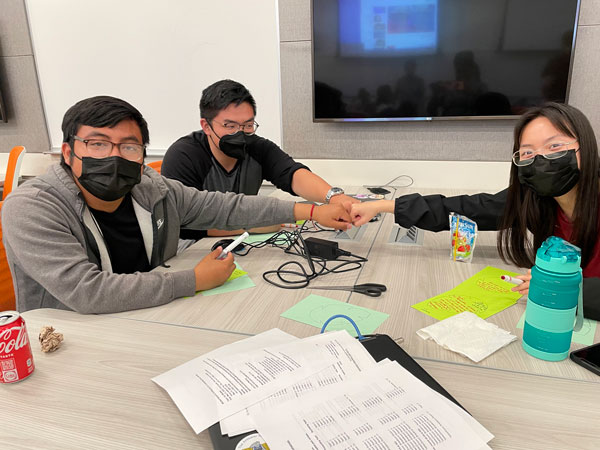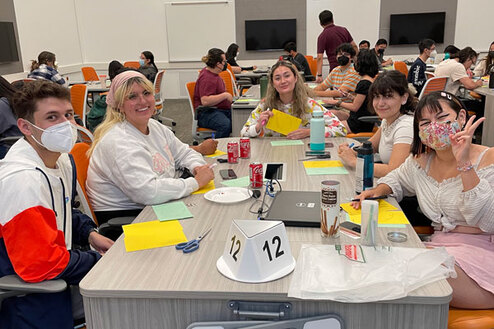Fostering Future Teachers' Well-Being
The UCI School of Education’s teacher education programs encourage students to be change agents and focus on mental health and self care.
|
By Christine Byrd
December 14, 2022 The challenges of the pandemic brought teachers’ well-being into focus. Educators today report stress levels almost twice as high as other working adults, and 44% say they are likely to quit in the next two years. “Teaching is hard, and it always has been. I thought about quitting my job multiple times from day one when I was a teacher,” said Hosun Kang, School of Education faculty director of teacher education and associate professor. “Not many people really deeply understand why being a teacher is so hard and complex.” UCI School of Education’s teacher education programs aim to not only protect the health and well-being of future teachers, but to foster their resiliency for the journey ahead – and, more importantly, help them change the educational system. |
In the UCI CalTeach program, undergraduates earn their teaching credential while also earning their bachelor’s in science or math. The program is transitioning toward “ungrading” in their education courses, as well as flexible due dates for assignments, which aim to reduce stress for its 250 students, who are already in notoriously challenging classes for their majors. Students also practice grounding exercises at the beginning of each class to help focus and center themselves.
“We make it a priority to acknowledge that our students’ well-being is more important than grades or completing our program,” said Doron Zinger, director of CalTeach. “It’s important to acknowledge that they’re a human first, a student second, and a future teacher after that.”
The CalTeach program offers annual sessions about campus resources including the Fresh Basic Needs Hub food pantry for students with food insecurity, the Counseling Center, and the red folder program for students in crisis. CalTeach’s student advisory board recently led a pledge drive for the Green Bandana Project, a nationwide suicide prevention and mental health awareness program. And once a year, CalTeach brings a professional for UCI’s Counseling Center to talk about how to support their K-12 students’ mental health – with an underlying message of how to take care of their own mental health, too.
The program office provides students a “home base” with snacks, a couch to catch a quick nap, and various support groups. Fourth-year math major Gisselle Arlyn Aguirre-Ortiz facilitates a CalTeach SOS group, which originally stood for Seniors Only Space.
“Being part of the space, I’ve met amazing people who I know I can reach out to anytime,” Aguirre-Ortiz said. “Also it’s a place where I know I can come with my ideas, failures and successes, and they will be there to support me in a non-judgmental and loving way.”
“We make it a priority to acknowledge that our students’ well-being is more important than grades or completing our program,” said Doron Zinger, director of CalTeach. “It’s important to acknowledge that they’re a human first, a student second, and a future teacher after that.”
The CalTeach program offers annual sessions about campus resources including the Fresh Basic Needs Hub food pantry for students with food insecurity, the Counseling Center, and the red folder program for students in crisis. CalTeach’s student advisory board recently led a pledge drive for the Green Bandana Project, a nationwide suicide prevention and mental health awareness program. And once a year, CalTeach brings a professional for UCI’s Counseling Center to talk about how to support their K-12 students’ mental health – with an underlying message of how to take care of their own mental health, too.
The program office provides students a “home base” with snacks, a couch to catch a quick nap, and various support groups. Fourth-year math major Gisselle Arlyn Aguirre-Ortiz facilitates a CalTeach SOS group, which originally stood for Seniors Only Space.
“Being part of the space, I’ve met amazing people who I know I can reach out to anytime,” Aguirre-Ortiz said. “Also it’s a place where I know I can come with my ideas, failures and successes, and they will be there to support me in a non-judgmental and loving way.”
|
“Our Teacher Diversity Advocates host speakers and panels featuring alumni of color to talk about their struggles and acknowledge that there are institutional barriers for teachers of color that we need to be transparent about and work to dismantle." – Director of Teacher Education Virginia Panish |
In addition to the CalTeach program for undergraduates, UCI offers an MAT+Credential program that serves aspiring teachers who already have a bachelor’s degree. To earn their teaching credential and Master of Arts, candidates teach in classrooms, take courses at UCI in the afternoon and evenings, complete over 600 hours of clinical practice, prepare a high-stakes teacher performance assessment, and interview for full-time positions over a 14-month period. It’s inevitably stressful, said Virginia Panish, director of teacher education, but its 140 candidates tend to be highly motivated to pursue teaching careers, often having already worked as coaches or classroom aids.
|
“This is a really challenging program, but we hope that our students come away understanding the complexity of teaching as well as the resources and perspective to inquire about their own practice without blaming anyone – students, parents, other teachers or themselves,” said Panish. “Understanding that teaching is complex and is always going to be intellectually and emotionally challenging, helps sustain you as an engaged and resilient teacher.”
One way the program supports candidates is by fostering a supportive community. MAT uses a cohort structure, which means all candidates take the same courses, getting to know each other over the span of the program. Instructors, program coordinators and student representatives encourage collaboration and relationship building through inclusion activities and social events – with the hope that will ensure the future teachers seek out similarly supportive and productive relationships with their colleagues in schools.
Additionally, MAT and CalTeach both host affinity groups that serve diverse student identities, particularly for groups underrepresented in the teaching profession. Three years ago, MAT started funding Teacher Diversity Advocates, students who organize events to provide perspectives and support for marginalized groups.
“First generation, Latinx and Black teachers are underrepresented in the profession,” said Panish. “Our Teacher Diversity Advocates host speakers and panels featuring alumni of color to talk about their struggles and acknowledge that there are institutional barriers for teachers of color that we need to be transparent about and work to dismantle.”
One way the program supports candidates is by fostering a supportive community. MAT uses a cohort structure, which means all candidates take the same courses, getting to know each other over the span of the program. Instructors, program coordinators and student representatives encourage collaboration and relationship building through inclusion activities and social events – with the hope that will ensure the future teachers seek out similarly supportive and productive relationships with their colleagues in schools.
Additionally, MAT and CalTeach both host affinity groups that serve diverse student identities, particularly for groups underrepresented in the teaching profession. Three years ago, MAT started funding Teacher Diversity Advocates, students who organize events to provide perspectives and support for marginalized groups.
“First generation, Latinx and Black teachers are underrepresented in the profession,” said Panish. “Our Teacher Diversity Advocates host speakers and panels featuring alumni of color to talk about their struggles and acknowledge that there are institutional barriers for teachers of color that we need to be transparent about and work to dismantle.”
|
Both MAT and CalTeach provide affinity groups for students based on their diverse identities. CalTeach also requires participants to write a paper about improving a pedagogical practice to better support a group of students – from those with disabilities to those who identify as LGBTQ.
“Our overarching theory is that you don’t need every teacher in the school to be a champion for every single marginalized group of students, but you need one teacher who makes a meaningful difference for a particular group of students at that school,” Zinger explained. Many of these efforts serve a dual purpose of supporting aspiring teachers, as well as their future pupils. For example, teachers in training practice Restorative Justice Circles, a model of group sharing that builds community and fosters deeper relationships. Learning to participate in the circles helps them implement the practice in their own classrooms later. |
Both training programs also prepare future teachers to recognize trauma or homelessness in their students, and how to find appropriate resources on their campus to help the young people – because teachers need to know it’s not their responsibility to personally address all their students’ challenges.
Kang, the faculty director who oversees both programs, said UCI aims to develop teachers with a strong sense of self, who can recognize and empathize with those who are different from them, and have the support systems to be resilient in the face of dynamic challenges in the school system.
“We work really hard to create programs that prepare teachers who can be change agents in schools, breaking the cycle which has caused so much harm for students of color and marginalized communities,” said Kang. “Our goal is not just teaching how to teach, but to help them to become who they are, the whole person, and encourage them to be part of changing the system.”
Kang, the faculty director who oversees both programs, said UCI aims to develop teachers with a strong sense of self, who can recognize and empathize with those who are different from them, and have the support systems to be resilient in the face of dynamic challenges in the school system.
“We work really hard to create programs that prepare teachers who can be change agents in schools, breaking the cycle which has caused so much harm for students of color and marginalized communities,” said Kang. “Our goal is not just teaching how to teach, but to help them to become who they are, the whole person, and encourage them to be part of changing the system.”



